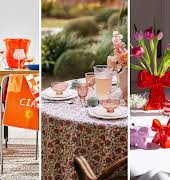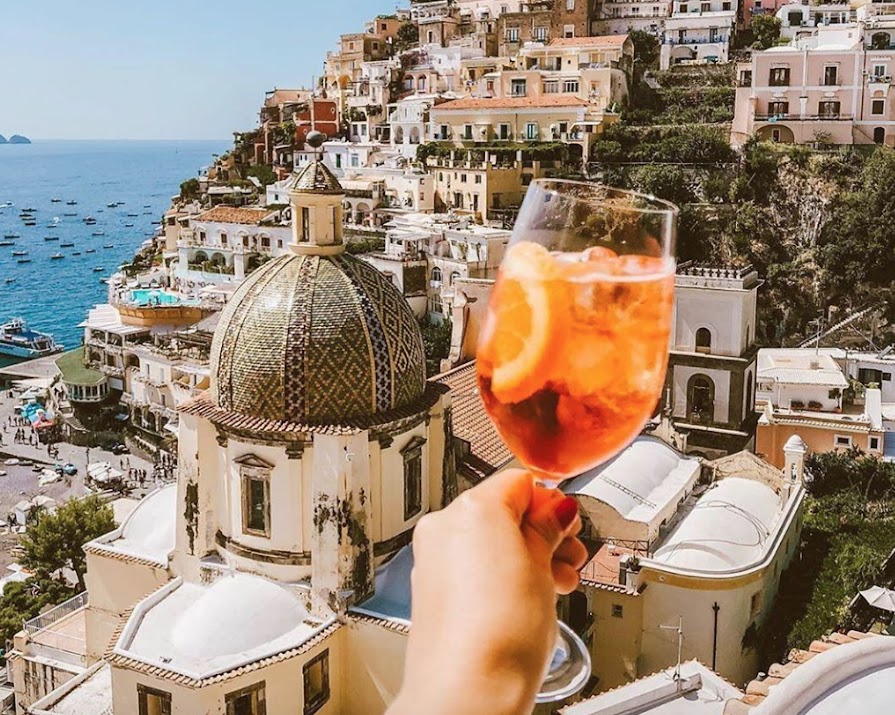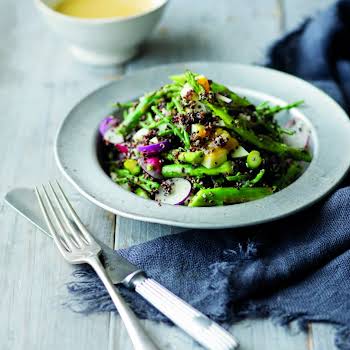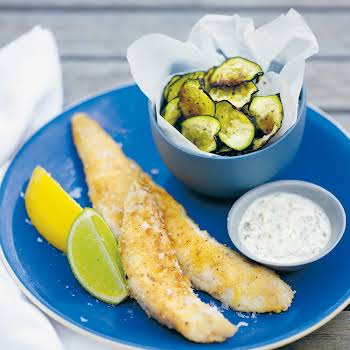Fact or fiction: Is an Aperol Spritz one of the healthier drinks you can order this summer?
By Freya Drohan
11th Jul 2019
11th Jul 2019
It’s slightly lower in calories than other drinks – but is Aperol Spritz a ‘healthier’ drink choice? We speak to a health consultant to find out
You’ve likely seen the tell-tale hue of the orange spirit in fancy glasses everywhere recently – it’s Aperol’s summer; we’re just living in it.
I, for one, have fallen prey to the cocktail-du-jour’s tart and refreshing charms. A quick Google search led me to believe that, wait a second, an Aperol Spritz actually isn’t as laced with calories and sugar as I initially presumed (not that this revelation gives you the green light to drink it by the bucket load, but it turns out there are far worse things you can order from the beverage menu… from a health perspective at least).
What’s in it?
Aperol is an Italian apéritif made of gentian, rhubarb, and cinchona, among other ingredients. According to this article, 35ml Aperol sets you back 85 calories, while a 60ml splash of Prosecco is around 40 calories. Soda water, of course, is all of zero calories. A zesty summer drink for just 125 calories… had I found the perfect summer order?
View this post on Instagram
Nutritionist weighs in
To be sure, I asked Tom Coleman, a leading health consultant and the CEO/co-founder of My Nutrition Ireland for his two cents.
“In terms of calories and energy density, Aperol Spritz (if made as recommended) is pretty much on a par with a glass of rosé or serving of cider,” Coleman said. “It may just be marginally the better choice though, due to the alcohol content and the fact that it is made using a variety of herbs; which have certain health-promoting properties.
“But, before we drink a gallon of it, let’s be clear: just because something is a very slightly better alternative (and truthfully about 1-2% less damaging to our health than another drink), it does not make it ‘good for us’,” Coleman said.
View this post on Instagram
“All too often we tend to box things into ‘good’ or ‘bad’ for us. Quantity is always critical. The whole ‘summer vibe’ of ‘let’s just add fruit to any drink and then feel better about it’ also comes into play… there is more nutrition in the orange slice,” Coleman added.
Beyond the calories
While I was making my decision based on calories alone, Coleman said it’s important to never judge drink or food based solely on calories.
“I would also take into account other factors, like the chemical make-up of the drink. Red wine, for example, contains tannins and polyphenols – both known to be beneficial to cardiac health, brain health and help reduce oxidative stress. This impacts things like ageing, oxidative damage, cellular repair and inflammation. Again, context is required – you can get ten times the amount of polyphenols from a handful of berries!”
Low alcohol
So, is there any benefit to drinking spirits that are low in alcohol? Yes, it seems.
“Delving slightly deeper into the effects, alcohol impacts our sleep quality and recovery in many ways. Essentially, we do not go as deep into restorative sleep when we drink alcohol.
“Skin repair, immunity, hormonal balance and many factors are impacted negatively along with psychological neglect. Although sleep onset is no problem after a few glasses of our favourite tipple, ‘sleep debt’ acts like an accelerant for ageing. There is a very good reason they call it beauty sleep,” Coleman said.
View this post on Instagram
Good to be social
As social calendars tend to get busier in the summertime, ergo more occasions calling for a celebratory drink or two, Coleman said there are lots of reasons to let our hair down once in a while.
“We must point out the beneficial social aspect of alcohol and move away from always looking at it from a completely negative point of view,” Coleman said. “People appear to have less time and be more stressed out than ever. Getting together socially is one of the most powerful things you can do for your health and the science backs it up.”
Coleman points to the findings of Susan Pinker; a health researcher who spent a full year in Sardinia, Italy, investigating why the island has more people who have lived to 100 than any place else on earth. Pinker came up with a list of the top ten predictors. Number one and two on the list were social inclusion and close relationships.
“So, meeting friends, socialising and having a laugh is a very protective mechanism,” Coleman said. “Try diluting your drink with more ice and drinking more water. Alcohol is a diuretic which dehydrates you and your skin. Have an electrolyte drink ready the next morning to help your body rehydrate,” he advises.
“Foods high in B12 and Vitamin C will help things like brain function, and some ginger and mint will really help detoxify. You try some virgin cocktails as well… like a delicious and refreshing Mojito or Watermelon Cooler.”
View this post on Instagram
For more information about Coleman and My Nutrition Ireland’s services, see here.
Feature photo: AperolUSA on Instagram
Read more: 30 questions that will strengthen your closest friendship
Read more: 10 ways to manage your allergies during pollen season
Read more: Music festivals need to be more female friendly, here’s why























